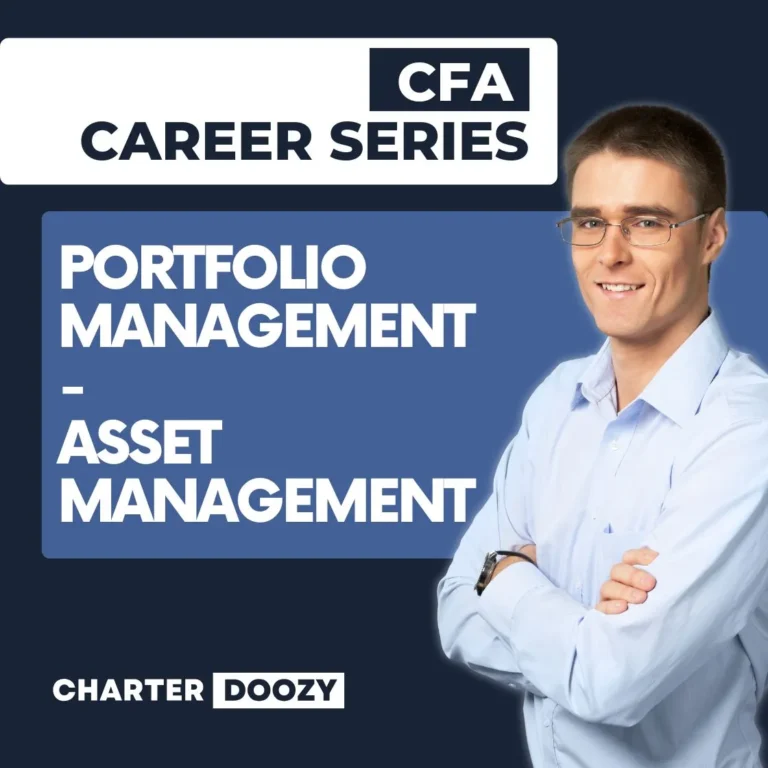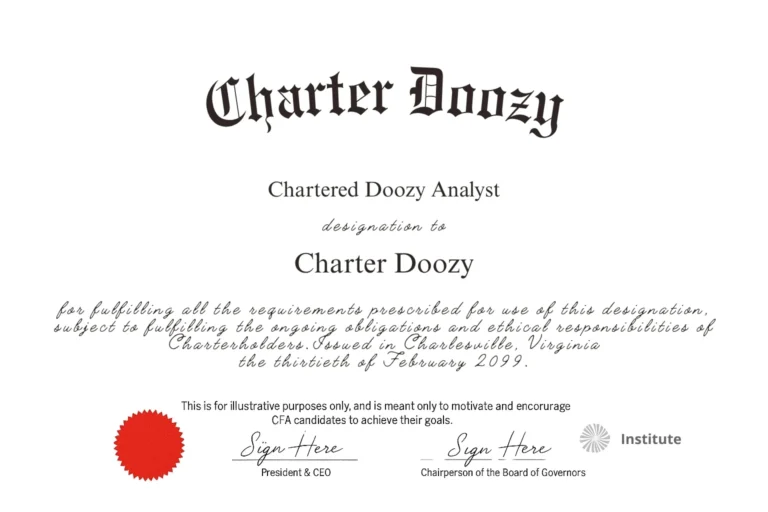The journey toward becoming a Chartered Financial Analyst (CFA) is no small feat.
But the rewards (both personal and professional) are enormous.
Whether you’re grinding away at your CFA studies in the evenings or managing a hectic full-time finance job during the day, one question likely dominates your thoughts… “What does my future look like as a CFA Charterholder?”

This article explores CFA careers and the various paths available in the finance industry.
We’ll dig into the specifics, from buy-side and sell-side roles to the growing niche of ESG investing.
By the end, you’ll have a clear idea of where this prestigious qualification can take you and why it’s a game changer for your finance career.
Why Pursue a CFA? The Power of Specialization
When you think of a CFA career, imagine yourself armed with a globally recognized qualification that sets you apart from your peers.
But why is the CFA designation so powerful?
In today’s finance world, specialization is key.
Employers are looking for professionals who understand the complexities of investment analysis, portfolio management, and financial ethics.
The CFA provides rigorous training in these areas, giving you an edge that many generalist finance professionals lack.
What Makes the CFA Special?
The CFA program is designed to equip you with the expertise needed to handle advanced financial tools and investment strategies.
The curriculum covers quantitative methods, financial reporting and analysis, corporate finance, and portfolio management, preparing you for high-stakes roles that require a deep understanding of financial markets.
Unlike an MBA, which provides a broad view of business, the CFA dives deep into finance.
Think of it like this.
An MBA may teach you how to navigate a ship, but the CFA teaches you how to build it, optimize it, and sail it through the stormiest markets.
If you’re looking to make informed, data-driven decisions that directly affect portfolios and investments, the CFA is the qualification that will get you there.

Exploring CFA Career Paths
Once you’ve passed all three levels of the CFA exams and gained the required work experience, an array of finance careers open up to you.
Let’s explore some of the most common CFA careers and the types of jobs you might pursue.
1. Portfolio Management
Portfolio managers are the strategists of the finance world.
They oversee investment portfolios, making decisions about which assets to buy, hold, or sell.
This role is a natural fit for CFA Charterholders, who have the expertise to make data-driven decisions based on market trends, company performance, and global economic factors.
Explore portfolio management in more detail.
Why Portfolio Management?
As a portfolio manager, you’re at the helm, making strategic decisions that can have significant financial consequences.
Whether you’re managing portfolios for private clients or large institutional investors, the role offers a high level of responsibility and the potential for lucrative rewards.
It’s also where many CFA charterholders find their niche, using their technical skills to create optimized portfolios for clients.
Doozy Digest
A newsletter for CFA candidates
Subscribe for:
✔ Insightful tips
✔ Expert advice
✔ Career motivation
✔ Exam inspiration
Stay updated and subscribe today!
2. Equity Research Analyst
Equity research analysts provide in-depth analyses of stocks and other investments, offering recommendations to portfolio managers and investors.
If you’re someone who loves numbers, data, and making informed predictions, this is one of the most exciting roles in CFA careers.
Why Equity Research?
The beauty of equity research is that it allows you to dive deep into company financials, market conditions, and global trends.
It’s your job to assess a company’s performance and its potential to succeed or fail.
For a CFA Charterholder, this role is a playground for applying the financial theories and valuation techniques learned during your studies.

3. Risk Management
With increasing regulatory pressures and a volatile global economy, risk management is becoming a highly sought-after area of expertise in finance.
CFA Charterholders in this role identify, analyze, and mitigate risks in investment strategies and corporate finance operations.
Why Risk Management?
Risk management is about avoiding losses.
It’s about understanding market dynamics and leveraging that knowledge to create opportunities.
Chartered Financial Analysts in risk management roles are essential in helping firms navigate the complexities of modern finance, where even small missteps can result in substantial losses.
4. Wealth Management
The role of a wealth manager involves offering tailored financial advice to high-net-worth individuals (HNWI).
CFA Charterholders in this role create personalized investment strategies based on their clients’ financial goals, risk tolerance, and future needs.
Why Wealth Management?
Wealth management offers a perfect blend of financial expertise and client relations.
It’s about building long-term relationships with clients and helping them manage their wealth in a way that ensures their financial security and growth.
For professionals with strong interpersonal skills, this career path offers both intellectual and emotional rewards.

5. ESG Investing
If there’s one area of finance that’s exploding right now, it’s Environmental, Social, and Governance (ESG) investing.
As investors become more conscious of sustainability, ethical investing is no longer a niche—it’s the future.
Why ESG?
ESG investing allows Charterholders to use their financial expertise to drive positive change in the world.
It’s not just about generating returns while investing in companies that prioritize sustainability, ethical labor practices, and governance.
For those passionate about using finance as a tool for social good, ESG investing is a meaningful and impactful career option.
6. Financial Consulting
Consulting is one of those very broad job titles which could mean anything.
For Charterholders, this can also take a broad range of scopes and shapes.
It can be lucrative (and flexible) option for CFA Charterholders, where you act as an external expert providing strategic advice to companies.
Consultants are called upon to tackle complex financial problems, from mergers and acquisitions to restructuring corporate finance operations.
Why Financial Consulting?
This path offers a diverse range of projects and the opportunity to work with different companies across various sectors.
If you thrive on problem-solving and enjoy working in fast-paced environments, consulting could be your ideal CFA career.
Does the CFA Charter Help with Career Flexibility?
One of the most underrated benefits of becoming a CFA Charterholder is the flexibility it provides.
Whether you want to work in New York, London, Hong Kong, or a remote advisory role, the CFA designation is recognized globally.
Global Demand for CFA Charterholders
The CFA Institute has over 150,000 Charterholders worldwide, and the demand continues to grow.
In regions like Asia and the Middle East, the designation is highly sought after as financial markets expand and new regulatory standards emerge.
The global recognition of the CFA Charter means that you’re not limited to working in one country.
With a CFA qualification, the world becomes your playground.
Does the CFA Help with Work-Life Balance?
Let’s face it – many roles in finance are notorious for demanding long hours and intense work.
However, (believe it or not) the CFA Charter can offer pathways to careers with a more balanced lifestyle.
Granted, this is not common for the A-Type personalities drawn to the CFA designation.. but many examples abound.
Positions in wealth management, consulting, and consulting can provide more flexible working hours, making it easier to maintain a healthy work-life balance.
How the CFA Charter Positions You for Leadership
Having a CFA doesn’t just open doors to specialized roles—it also sets you up for leadership positions. Many CFAs climb the corporate ladder to become Chief Investment Officers (CIOs), heads of investment teams, or directors of asset management firms.
The CFA curriculum covers essential leadership topics like ethics, corporate governance, and client communication.
All are critical skills for future leaders in finance.
Combine that with the technical knowledge gained through years of study, and you’re looking at a strong foundation for managing teams and steering firms toward success.
Final Thoughts
The journey to becoming a CFA Charterholder is challenging.
But the career options and professional opportunities it opens up can be great.
Obviously, there is more that goes into a successful career than education – but a solid qualification, like the CFA Charter, can sure help.
Whether you’re aiming to manage portfolios, lead investment teams, or make an impact through ESG investing, the CFA designation gives you the tools to succeed.
It’s a credential.
It’s also a passport to a successful, flexible, and meaningful career in finance.
Now, it’s time to reflect: Where will your CFA journey take you? The possibilities are endless, but the choice is yours to make.









